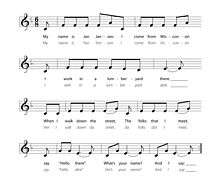Yon Yonson
"Yon Yonson" is an infinitely recursive poem, nursery rhyme or song, perhaps best known from the novel Slaughterhouse-Five by Kurt Vonnegut, although Vonnegut did not create it.
Origins of the song
The song is often sung in a Scandinavian accent (e.g. j pronounced as y, w pronounced as v). This accent is revealed by the name "Yon Yonson", which when recited in American English is usually rendered "Jan Jansen" or "John Johnson". The Swedish pronunciation "Yon Yonson" probably dates the origin of the song to soon after the Swedes' arrival in the United States.[1]
A possible origin of the song is the dialect stage comedy Yon Yonson by Gus Heege and W. D. Coxey (1890).[2][3] The play's setting included a Minnesota lumber camp. However, no evidence shows that the song was actually performed as part of the play.
Lyrics

Numerous versions of the song exist, but all are similar to the following:
- My name is Yon Yonson,
- I live in Wisconsin.
- I work in a lumber yard there.
- The people I meet as
- I walk down the street,
- They say "Hello!"
- I say "Hello!"
- They say "What's your name."
- I say: My name is Yon Yonson... (repeated again and again).
Another version goes:
- My name is Yon Yonson,
- I come from Wisconsin
- I work in a lumber mill there
- All the people I meet
- As I walk down the street
- Ask me how in the hell I got there
- So I tell them: My name is Yon Yonson...
Another version goes:
- My name is Yon Yonson,
- I come from Wisconsin
- I work in a lumber mill there
- All the people I meet
- As I walk down the street
- They say "Hello, Yon Yonson, hello"
Another version goes:
- My name is Yon Yonson
- I come from Wisconsin
- I work in a lumber yard there, you see.
- And the people I meet,
- When I walk down the street.
- Say 'Hello'.
- And I say 'Hello'.
- And they say 'What's your name'?
- And I say...
Another version goes:
- My name is Yon Yonson
- I come from Wisconsin
- I work in the Lumberyard there:
- I got hit by a log
- and I live with a dog
- and somehow just set fire to my hair.
Another version goes:
- My name is Yon Yonson
- I come from Wisconsin
- I work in a Lumberyard there
- As I walk down the street
- All the people I meet
- Say "Hey, What's your name?"
- And I say...
Another version goes:
- My name is Eye Yonson
- I come from Wisconsin
- I work in a Lumberyard there
- As I walk down the street
- All the people I meet
- Ask me how I came to be there
- And I tell them...
Other occurrences of the song
- In the novel Slaughterhouse-Five by Kurt Vonnegut, "Yon Yonson" is used as a repeated motif, ultimately serving as a model for the recursive, time-repeating structure of the book.[4][5]
- The novel Dodsworth by Sinclair Lewis in Chapter 11[6]
- Carl Sandburg included the song in his 1972 folk song collection, Flat Rock Ballads.[7][8]
- The Canadian band The Dave Howard Singers released an industrial/punk version of "Yon Yonson" in 1987.
- The Children's Band Ralph's World released a version of this on their 2003 album Peggy's Pie Parlor. The lyrics have been changed slightly from what is quoted in this article.
- The phrase was also used in a TV promotion ("Altered States") for Calvin Klein perfume.
- In the video game Psychonauts, Sasha Nein will begin to recite this in an injury-induced daze if the battle with the mega-censor continues long enough.
- The computer game "Baldur's Gate II" has a gnome character who joins the player's party named Jan Jansen. He often bursts into very mundane stories about himself that never seem to end.
- The song appears in the novel Coverup by Jay Bennett.
References
- "New Upsala: the first Swedish settlement in Wisconsin". Archived from the original on September 29, 2007. Retrieved March 26, 2007.
- Anne-Charlotte Harvey, "Swedish Theater", in Philip J. Anderson & Dag Blanck, eds., Swedes in the Twin Cities: Immigrant Life and Minnesota's Urban Frontier (Minnesota Historical Society Press, 2001), ISBN 978-0873513999, pp. 156ff. Excerpts available at Google Books.
- Landis K. Magnuson, "Ole Olson and Companions as Others: Swedish-Dialect Characters and the Question of Scandinavian Acculturation", in Rhona Justice-Malloy, ed., Theatre History Studies 2008 (University of Alabama Press, 2008), ISBN 978-0817355029, pp. 75ff. Excerpts available at Google Books.
- Peter Freese, "Kurt Vonnegut's Slaughterhouse-Five, or, How to Storify an Atrocity", in Harold Bloom, ed., Kurt Vonnegut's Slaughterhouse-five (Infobase Publishing, 2009), ISBN 978-1438128740, pp. 23, 25-26. Excerpts available at Google Books.
- Kate McLoughlin, Authoring War: The Literary Representation of War from the Iliad to Iraq (Cambridge University Press, 2011), ISBN 978-1139497374, pp. 129ff. Excerpts available at Google Books.
- Lewis, Sinclair (1947). Dodsworth. Modern Library. p. 94.
- Stefan Wirz, Carl Sandburg discography (accessed 2014-11-27).
- Paul Friedrich, "Polytropy", in James W. Fernandez, ed., Beyond Metaphor: The Theory of Tropes in Anthropology (Stanford University Press, 1991), ISBN 978-0804718707, p. 28. Excerpts available at Google Books.
External links
- Calvin Klein - "Altered States" promotion for CK One and CK Be, based on the phrase.
- David Howard Singers "Yon Yonson"
- Vanished America "Yon Yonson" poster